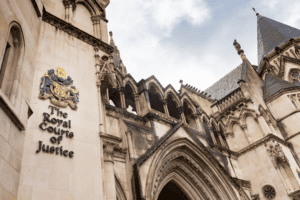Not Wise to Explain Scheme to Defraud to FBI Informants

See the full video at https://rumble.com/v3oblxy-not-wise-to-explain-scheme-to-defraud-to-fbi-informants.html and at https://youtu.be/9kp_pgOLGGw
Brian Higgins diverted for personal use funds he received from his mortgage servicer to repair damage to his home caused by a broken fish tank. He also filed a lawsuit against two witnesses for the prosecution, accusing them of misdirecting the funds instead of himself. For his conduct, a jury convicted Higgins on three counts of mail fraud under 18 U.S.C. §§ 1341-42 and two counts of retaliating against a witness, victim, or an informant under 18 U.S.C. § 1513(e). He appealed.
In United States Of America v. Brian Higgins, No. 22-3538, United States Court of Appeals, Sixth Circuit (October 6, 2023) affirmed his conviction but gave him a win by requiring the District Court to reconsider the amount of restitution he must pay.
FACTS
In 2007, Higgins bought a house in Dayton, Ohio, which he financed with a $900,000 mortgage. By April 2010, Higgins had defaulted on his mortgage payments and, as of October 2016, still owed almost all that he had borrowed ($891,335.37). On top of that, the house was encumbered with about $815,000 in liens, including for federal taxes over the years.
Higgins’s 1,000-gallon fish tank sprang a leak and caused significant damage to the home.
Higgins commissioned Michael Marshall and Scott Waters, contractors and owners of United Demolition, to do the work. But during their initial consultation, Higgins detailed his plan to divert the home repair funds for his own personal use. Higgins asked the contractors to help him with his plan by falsifying documents to procure the insurance monies. Unbeknownst to Higgins, however, the contractors were confidential informants for the FBI on an unrelated matter.
Higgins was initially indicted for mail fraud, wire fraud and aiding and abetting. But after learning of the contractors’ roles in the government’s investigation, Higgins, while under arrest, filed a pro se lawsuit against them both, highlighting their roles as informants and alleging that they were the ones who defrauded Nationstar and the insurance company.
The jury found Higgins guilty of three counts of mail fraud and two counts of retaliating against a government witness. The court sentenced him to an aggregate of 3 years’ imprisonment and ordered him to pay $84,113.04 in restitution.
ANALYSIS
The Sixth Circuit noted that the trial court did not abuse its discretion when it denied Higgins’s motion for additional Funds to hire an expert accountant and argued the district court erred when it admitted evidence of about $815,000 in liens that were on his residence when he filed his insurance claim.
Higgins placed both his general and specific intent at issue when he pleaded not guilty to the mail fraud charges. Evidence of a defendant’s financial condition was relevant and admissible for the proper purpose of establishing motive or intent in cases involving financial crimes. Higgins’s significant financial woes revealed an incentive for him to use insurance monies for his own purposes rather than their intended purposes. Trial testimony bore this out; the contractors explained how Higgins misappropriated the insurance funds for personal business ventures.
The government moved to introduce the recordings to prove retaliatory intent and common plan in relation to the witness retaliation charges.
The parallel between Higgins’s earlier advice to another person to flip and reverse allegations of wrongdoing against an accuser of that person and his later actions in accusing witnesses in his own case of the very crimes for which he stood trial was striking. The Sixth Circuit explained that any reasonable juror would understand that his statements were not confessions to any of the crimes charged. Rather, they would grasp that this evidence might shed light on Higgins’s possible intent in filing suit against the contractors.
Restitution
Higgins’s final challenge was to the district court’s May 25, 2022, order of restitution. The recommended amount equaled the total funds Higgins diverted from the insurance disbursements. The Mandatory Victims Restitution Act of 1996 (“MVRA”), 18 U.S.C. § 3663A, requires the district court to award restitution to victims of fraud. Restitution must be awarded in the full amount of each victim’s losses. That said, restitution is intended to compensate victims only for losses caused by the conduct underlying the offense of conviction.
The Sixth Circuit affirmed Higgins’s convictions and ordered the trial court to inquire further as to the appropriate amount of restitution due to Nationstar.
People who commit insurance fraud and are caught have chutzpah without limitation. This appeal, with dozens of pages of opinion to resolve the multiple complaints about his conviction that Higgins filed, the Sixth Circuit did away with all his arguments and threw him a bone by requiring the Circuit Court to reconsider the amount of restitution even though it will probably never be collected considering the debts that may have caused him to attempt insurance fraud.
 (c) 2023 Barry Zalma & ClaimSchool, Inc.
(c) 2023 Barry Zalma & ClaimSchool, Inc.
Please tell your friends and colleagues about this blog and the videos and let them subscribe to the blog and the videos.
Subscribe to Excellence in Claims Handling at locals.com at https://zalmaoninsurance.locals.com/subscribe or at substack at https://barryzalma.substack.com/publish/post/107007808
Go to Newsbreak.com https://www.newsbreak.com/@c/1653419?s=01
Follow me on LinkedIn: www.linkedin.com/comm/mynetwork/discovery-see-all?usecase=PEOPLE_FOLLOWS&followMember=barry-zalma-esq-cfe-a6b5257
Daily articles are published at https://zalma.substack.com. Go to the podcast Zalma On Insurance at https://podcasters.spotify.com/pod/show/barry-zalma/support; Go to Barry Zalma videos at Rumble.com at https://rumble.com/c/c-262921; Go to Barry Zalma on YouTube- https://www.youtube.com/channel/UCysiZklEtxZsSF9DfC0Expg; Go to the Insurance Claims Library – http://zalma.com/blog/insurance-claims-library/
Like this:
Loading…




